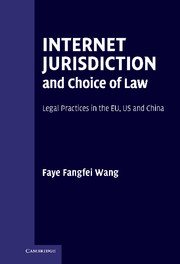Book contents
- Frontmatter
- Contents
- Preface
- List of Abbreviations
- Table of Cases
- PART I Introduction
- 1 Introduction
- PART II Jurisdiction
- PART III Choice of law
- PART IV Online dispute resolution
- PART V The future
- Appendix 1 Council Regulation (EC) No 44/2001 of 22 December 2000 on jurisdiction and the recognition and enforcement of judgments in civil and commercial matters (Brussels I)
- Appendix 2 Regulation (EC) No 593/2008 of the European Parliament and of the Council of 17 June 2008 on the law applicable to contractual obligations (Rome I)
- Bibliography
- Index
1 - Introduction
from PART I - Introduction
Published online by Cambridge University Press: 03 May 2011
- Frontmatter
- Contents
- Preface
- List of Abbreviations
- Table of Cases
- PART I Introduction
- 1 Introduction
- PART II Jurisdiction
- PART III Choice of law
- PART IV Online dispute resolution
- PART V The future
- Appendix 1 Council Regulation (EC) No 44/2001 of 22 December 2000 on jurisdiction and the recognition and enforcement of judgments in civil and commercial matters (Brussels I)
- Appendix 2 Regulation (EC) No 593/2008 of the European Parliament and of the Council of 17 June 2008 on the law applicable to contractual obligations (Rome I)
- Bibliography
- Index
Summary
What are electronic commercial transactions?
The combination of Internet services, webpage designs and computing devices has generated a new generation of commerce: electronic commerce. It is reflected in any form of business transactions in which the parties interact electronically rather than by physical exchanges. It can be carried out by an electronic ordering of tangible goods that are delivered physically using traditional channels such as postal services or commercial couriers. Alternatively, it can be completed directly online by electronic ordering, payment and delivery of intangible goods and services such as computer software, entertainment content, or information services. Electronic commercial transactions are one of the main components of electronic commerce which are conducted by private individuals and commercial entities without country boundaries.
Concepts and features
The concept of electronic commercial transactions is formed mainly of three components: electronic means, commerce and transactions. Electronic means is the method and channel of selling and buying. Commerce is the core nature and content of the activities. Transaction is the purpose and outcome of the activities or performance.
The establishment of an electronic commercial transaction presupposes the existence of a business transaction but creates a more efficient business environment through the use of electronic means.
There are two main types of electronic commercial transactions: business-to-business (B2B) and business-to-consumer (B2C). B2B describes trade between different businesses or entities. It can be completed by performance against payment or performance against performance.
- Type
- Chapter
- Information
- Internet Jurisdiction and Choice of LawLegal Practices in the EU, US and China, pp. 3 - 14Publisher: Cambridge University PressPrint publication year: 2010



